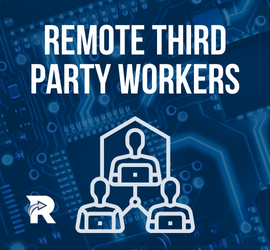
Third-party workers, especially remote workers, present a unique set of security threats. In a report from the Tel Aviv-based startup Talon Cyber Security it was stated that the use of third-party workers who use their own technology and don’t follow cyber security protocols presents risks for enterprises.
“The report highlights the risks of securing unmanaged, remote contractors in an enterprise environment. Many organizations depend on contractors and freelance workers to provide important services, but don’t have enough visibility into the technologies they are using or the potential security risks they take when conducting business.” (Cyber Security Dive).
It is possible to use third-party workers, if the right steps are taken. Some steps third party workers can take to ensure the safety of the enterprise include being vigilant in connection, storage, and security in your devices.
“While working from home is convenient and has many benefits, it also exposes both individuals and businesses to a range of cybersecurity risks. That’s why it is essential to give serious consideration to home cybersecurity. By following best practices, you can mitigate most cybersecurity work from home threats quite easily.” (Kaskpersky).
Third-party workers are on the rise according to a report.
“An increasing number of organizations are relying on contractors and freelancers for critical business functions amid a shift toward the gig economy, according to research from Forrester.” (Cyber Security Dive).
One way to increase the cyber security of third-party workers is to use antivirus, VPN, and secure your passwords and Wi-Fi.
“Not only can a comprehensive antivirus suite, such as Kaspersky Total Security, fend off up to 100% of online security threats, but it also automatically updates itself to stay on top of new and emerging threats. It also runs discreetly in the background of your other operations, so you won’t even notice the hard work it’s doing.” (Kaspersky). “VPN security can be enhanced by using the most robust possible authentication method. Many VPNs use a username and password, but you may want to think about upgrading to the use of smart cards. You can also enhance your encryption method for VPN access, for example, by upgrading from a Point-to-Point Tunnelling Protocol to a Layer Two Tunnelling Protocol (L2TP).”
Want to learn more about improving cyber security? Responsive Technology Partners is the leading cyber-security expert in the Athens, Metter, Milledgeville, Vidalia, and Atlanta, Georgia areas. We also have locations in Tampa, Florida, Roanoke, Virginia, and Raleigh, North Carolina. Service offerings include I.T. support, cyber-security and compliance, telephony, cloud services, cabling, access control, and camera systems. Our company’s mission is to provide world-class customer service through industry leading I.T. solutions that make every customer feel as if they are our only customer. Please visit our website to learn more: https://www.responsivetechnologypartners.com/.
Sources:
Cyber Security Dive. https://www.cybersecuritydive.com/news/third-party-workers-security-risks/639282/
Kaspersky. https://usa.kaspersky.com/resource-center/threats/remote-working-how-to-stay-safe




